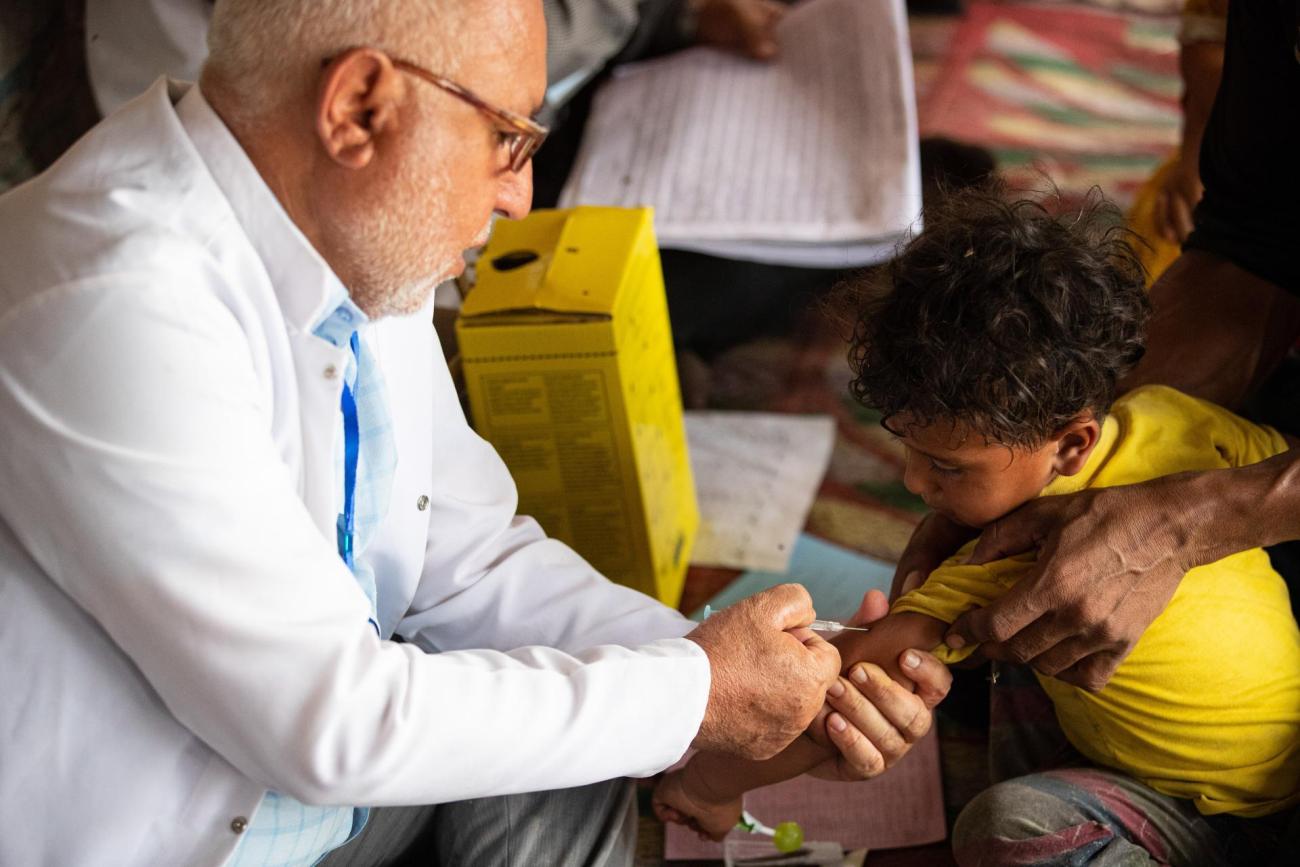Vaccines save children’s lives in remote areas of Iraq

By Monique Awad
UNICEF and WHO supported the Ministry of Health to vaccinate over 500,000 children through a multi-antigen campaign
Baghdad, Iraq, 18 July 2023 – Across the country, caregivers are bringing their children to get vaccinated as part of the Ministry of Health, UNICEF and WHO multi-antigen campaign.
At one of the Primary Health Care Centers in the south, the sounds of babies fill the waiting room. Veiled women carrying their babies are in a rush to get their children vaccinated to protect them from deadly diseases.
Asma Ali, 36, is one of the mothers waiting to get her 3-month-old baby girl, Rawan, vaccinated. Accompanied by her mother-in-law, Fourat, Asma is eager to vaccinate her newborn baby girl.
“I always bring my children to get vaccinated on time,” said Asma with pride. “I want to protect them from all diseases and give them the best start in life.”
In the 10-day-long campaign, a total of 1,303,587 doses of vaccines were used to vaccinate 523,584 children, more than half are girls. This includes 332,023 children vaccinated against measles, one of the most contagious diseases.
“This multi-antigen campaign is important to protecting children from vaccine-preventable diseases,” said Dr. Falah Wadi, Health Officer, UNICEF in Iraq. “It is critical especially when it comes to zero-dose children.”
Due to poverty, social norms and traditions, Asma got married at an early age. She has six children, five girls and one boy.
“I dropped out of school at the age of 14,” recalled Asma. “But thanks to the health workers, I was made aware of the importance of vaccinating my children and this is why I am here today.”
Reaching the unreached
Reaching the hardest-to-reach children is often times challenging. Yet, UNICEF established partnerships with various sectors of society that can influence caregivers and create demand for vaccine uptake.
With financial support from Al Waleed Philanthropies, UNICEF mobilized over 3,800 health workers and partnered with community mobilizers and religious leaders.
“We engaged with community mobilizers and religious leaders to reach the most vulnerable children with vaccines,” added Wadi. “This is critical so that children like Rawan are not left behind.”
In the southern part of Iraq, children living in the marshlands are among the hardest to reach. Nestled between the Tigris and Euphrates rivers, sits the Mesopotamian Marshes n Chibayish. The hamlet is most affected by climate change pushing families to move to areas where there is more water. While a few families remain.
“These families are most impoverished,” said Daham Jassim, Mobile Team Vaccinator, referring to the ones residing in the marshlands. “They live in remote areas and find it difficult to reach primary health care centers.”
Daham Jassim is one of the campaign’s mobile team vaccinators. For the past 20 years, he has been working on vaccinating children, especially those hardest to reach.
“I came here to vaccinate these children to ensure that every child is protected,” added Jassim.
Thanks to Jassim and other health workers, a total of 49,981 children who are under-immunized or missed out completely on their vaccines, were vaccinated during this campaign.
Between 2019-2021, globally 67 million children, about twice the population of California, missed out on vaccinations. Yet, in Iraq, immunization coverage has reached the highest levels in two decades, hoping that it will accelerate progress towards the Sustainable Development Goals.
Through the intensified integrated immunization outreach services have reached 90 per cent of children aged under 5 with the third dose of diphtheria, pertussis and tetanus (DTP) and the first dose of measles vaccines, the highest coverage in two decades.
“This multi-antigen campaign aimed at reaching those children who had still missed out on these and other vaccines,” said Wadi. “We hope to minimize the resurgence of vaccine-preventable diseases and further advance immunization coverage to beyond 95 per cent.”

